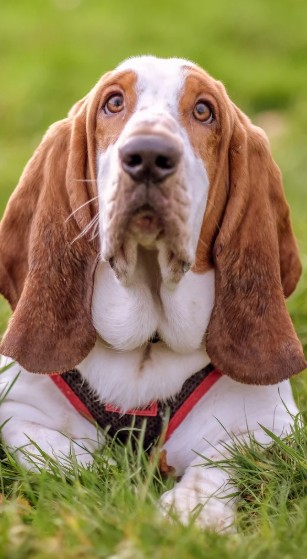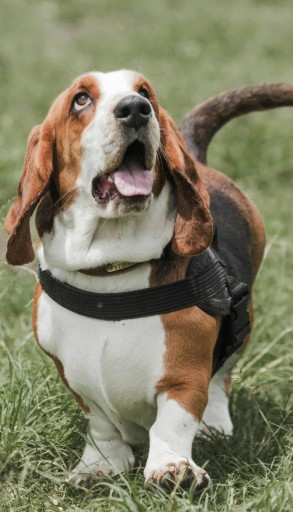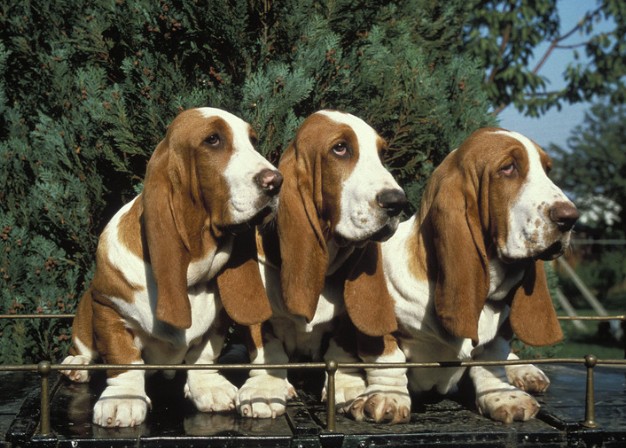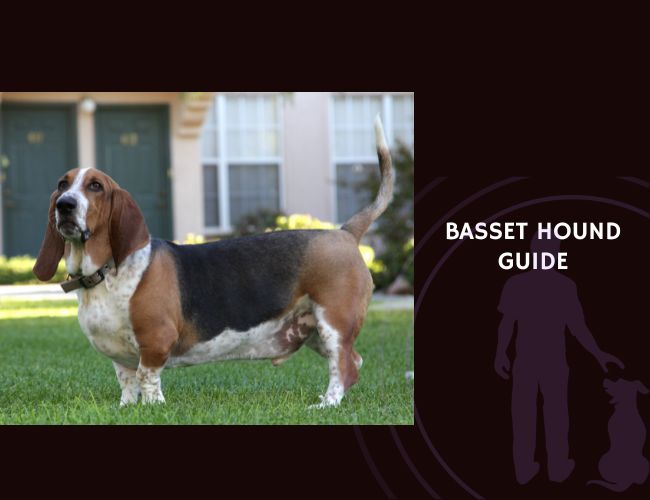Introduction to the Basset Hound
Rich History and Origins
The Basset Hound is a breed that stands out both for its charm and its fascinating backstory. Originally developed in France, Basset Hounds were bred to trail small game—mainly rabbits—thanks to their strong sense of smell and short stature. Their name comes from the French word “bas,” meaning “low,” referring to their iconic low-to-the-ground body. Over time, their skills made them popular hunting companions, and their friendly personalities helped them find a place in family homes around the world.
Distinctive Look and Physical Features
At first glance, you can’t miss a Basset Hound’s signature features. Their long, droopy ears and mournful, soulful eyes are hard to resist. Bassets have a sturdy, elongated torso supported by short, powerful legs. Their loose, wrinkled skin—especially around the face and neck—gives them a unique expression that many owners find endearing. Tails are carried high, and their coats are usually short, smooth, and come in a variety of hound color patterns like tricolor or red and white. This design isn’t just for looks—each trait plays a role in helping scent particles reach their nose more effectively during tracking.
Gentle Temperament and Social Qualities
If you are looking for a loyal and affectionate companion, the Basset Hound truly delivers. Known for their easygoing nature, they are patient with children and generally get along well with other pets when introduced properly. Many families love their gentle, sometimes comical personalities. They form deep bonds with their families and are known to show strong social attachment, often choosing to stay close to their favorite people. While their stubborn streak can sometimes challenge training, their food-motivation makes positive reinforcement fun and rewarding for both owner and dog.
With their quick adaptation to family life and distinctive personality, Basset Hounds bring warmth and charm to any home. Understanding their unique qualities lays the foundation for caring for their physical and emotional needs in your journey together. 😊
Character & Behavior
Exceptional Sense of Smell and Scent Tracking Abilities
Basset Hounds are famous for their remarkable sense of smell. If you have ever watched a Basset with its nose to the ground, you are seeing one of nature’s best scent detectors in action! Their olfactory system is outstanding due to a large olfactory bulb and a high number of scent receptors, placing them near the top of the canine world for scent-tracking. This impressive nose made them excellent hunting companions historically—and if your Basset gets loose on a trail, you’re seeing that focus in motion!
Their fixation on following a scent can lead to long meandering walks and a determination to track that many owners find both impressive and amusing. Yet, this strong scent drive means they sometimes “tune out” other commands, making patience and understanding key for families.
Independence and Task-Oriented Nature
Basset Hounds have a reputation for being independent thinkers. This can feel like stubbornness, but it’s actually a sign of their task-oriented working heritage. When their nose catches an interesting scent, they may become single-minded, solving problems and overcoming obstacles to reach their goal.
This independent streak can be an asset, showing their resourcefulness and making them more than willing to work on their own. However, you might find that this trait occasionally tests your patience, especially during training or on walks. Understanding and managing this independence is central to living in harmony with a Basset Hound.
Emotional Expression, Social Attachment, and Vocalizations
While science is still catching up to exactly how Basset Hounds form bonds, most owners agree these dogs are deeply affectionate. Bassets show their attachment by wanting to be near their humans—whether lounging nearby or following you around the house. Emotional expression comes through soulful eyes, body wiggles, and sometimes a little stubbornness when routines are disrupted.
One distinctive trait is their deep, echoing bay. Basset Hounds use this unique vocalization to communicate both during hunts and at home. Some find the baying charming, while others may need time to adjust. It’s just another way Bassets share their character with the world.
With a better understanding of their character and behavior, owners can appreciate why Basset Hounds are truly one-of-a-kind companions. 😊
Training & Education
Motivational Techniques and Food Responsiveness
Training a Basset Hound can be both an enjoyable and challenging experience. These dogs are famously motivated by food, so treats often work wonders as training rewards. You might find that a tasty morsel holds your Basset’s attention far better than verbal praise alone! Still, a varied approach, mixing food with gentle encouragement and petting, tends to create the best results for most individuals.
Because Basset Hounds have a tendency toward weight gain due to their slow metabolism, it is important to use small, healthy treats and to manage treat quantity within their daily caloric needs. We understand how easy it is to give “just one more,” but mindful snack choices support both learning and health in the long run 🥕.
Reliable Recall in a World Full of Smells
One of the main challenges in training a Basset Hound is recall. Their powerful noses often lead them straight into distraction, sometimes tuning out all commands as they track an interesting scent. Reliable recall requires building a rock-solid positive association with coming when called. Use high-value treats—something your dog rarely gets otherwise. Start in a quiet area, gradually adding distractions as your Basset improves.
You should also practice in short bursts to prevent boredom and to keep training fun. If your dog pauses, returns at a leisurely pace, or stops to sniff, stay calm and patient. With consistency, many Basset Hounds achieve an acceptable recall, although perfection might be elusive—always keep sessions upbeat and pressure-free!

Structuring Sessions to Prevent Fatigue
Basset Hounds, while intelligent, can tire if asked to focus for extended periods. Short, frequent sessions lasting five to ten minutes work best. Spread these out through the day rather than doing a single long lesson. At the end of each session, make sure to celebrate with praise or a special treat, reinforcing the positive experience 👍.
A gentle, supportive approach, patience, and well-chosen motivators make all the difference in bringing out the best in your Basset Hound’s training journey.
As you become more familiar with their needs, you’ll notice just how closely training ties into other aspects of their well-being.
Nutritional Recommendations
Energy Needs and Weight Control
Basset Hounds are special when it comes to their metabolism. Their bodies burn calories at a slower pace compared to other breeds, which means extra treats and big meals can quickly turn into unwanted pounds. Obesity is a major risk for these lovable companions, affecting their joints and even heart health. That’s why it’s important to measure their daily food portions and adjust the calories based on their activity level. Owners might find feeding two to three small meals throughout the day helps keep hunger at bay and prevents overeating. If you notice your Basset getting a bit round in the middle, it’s a good time to review their treats and table scraps! 🥕🐾
Supporting Joints and Bones
Basset Hounds’ iconic long bodies and short legs make them prone to joint issues, especially as they age. To help, you should look for foods that include glucosamine, chondroitin, and omega-3 fatty acids. These nutrients offer support for cartilage and reduce inflammation, which is beneficial for preventing and managing problems like Intervertebral Disc Disease (IVDD) and osteochondritis dissecans. Maintaining a healthy weight goes hand-in-hand with these specialized nutrients, making movement easier for your pup as they go about their daily sniffing adventures.
Managing Sensitivities, Skin, and Ear Health
Some Basset Hounds are sensitive to certain ingredients, such as grains or poultry. Limited ingredient diets featuring novel proteins, like fish or lamb, can help if your dog has food sensitivities. For those prone to ear infections and skin issues, a food rich in omega-3 fatty acids and zinc is recommended. These nutrients support healthy skin barriers and ear health, decreasing the chance of infections and discomfort.
A well-balanced, high-quality diet tailored to these needs will support your Basset Hound’s health and happiness for years to come. Remember, every dog has individual needs—a little extra attention at mealtimes goes a long way in their care.
With nutrition in mind, keeping your Basset healthy also involves understanding and preventing common health issues that may arise.
Low. Loyal. Laughable.
Stubbornness with heart.
Basset Hounds may resist commands, but not connection. Their independence isn’t disobedience—it’s heritage. Behind every slow response is a dog bred to think, not obey. When you speak their language, they listen in their own time.
Emotion that sticks.
Their eyes say more than words ever could. Affection is constant, quiet, and deep. They follow you not for praise, but for presence. A Basset doesn’t need to be near you—they wants to be. That difference matters.



Charm in slow motion.
They don’t rush, they glide. Not built for speed—but for steadiness. Whether on the scent of a trail or sleeping with ears over their nose, Bassets carry a peaceful kind of power that makes every home feel a little more human.
Common Health Issues
Spinal Health and Intervertebral Disc Disease (IVDD)
Basset Hounds have a unique body shape—long back, short sturdy legs—which makes them lovable but also puts them at higher risk for back issues, especially Intervertebral Disc Disease (IVDD). IVDD is a condition where the cushioning discs between the vertebrae of the spinal column become damaged, leading to pain, nerve problems, or even paralysis in severe cases. To help prevent IVDD, it is essential to keep your Basset at a healthy weight. Excess weight increases spinal strain and makes injuries more likely. Owners should avoid allowing Basset Hounds to jump from heights, like furniture or steps, as hard landings can lead to injury. Gentle daily walks and controlled play protect both body and back. Regular check-ins with your veterinarian also help catch subtle changes early for prompt care.
Ear Infections: Causes and Care
Long, pendulous ears are a classic Basset Hound feature 😍, but they create a warm and moist environment that is perfect for yeast and bacteria to grow. This makes Bassets especially prone to ear infections or otitis externa. You can help your dog stay comfortable by gently cleaning their ears each week with a vet-recommended cleaner. Check for bad smells, redness, or discharge—these can be early warning signs of infection. Make ear checks part of your routine grooming. If you see your Basset scratching or shaking its head, schedule a vet visit as soon as possible for a proper diagnosis and treatment plan.
Managing Obesity for Lifelong Health
Basset Hounds have a slow metabolism, making them more likely to gain weight than other breeds. Obesity can worsen joint pain, heart disease, diabetes, and the risk of IVDD. Keep your Basset fit by carefully measuring meals, providing healthy treats, and limiting table scraps. Daily low-impact walks support joint health and help manage weight. It’s important to ask your veterinarian for advice about the right weight and body condition for your individual dog, as each Basset is different 🤗.
Healthy habits set the foundation for a happy life together. Next, let’s explore how thoughtful exercise and enrichment can further improve your Basset Hound’s quality of life.
Exercise & Enrichment
Gentle Physical Activity
Basset Hounds are known for their calm and low-energy style, but that doesn’t mean they should skip regular exercise! Daily, gentle walks are ideal to keep their weight in check and support healthy joints. We recommend two short walks or controlled play sessions each day, about 15 to 20 minutes each. Be mindful of their long backs and short legs—avoid stairs and jumping, which could put stress on their spine. Owners might enjoy strolling through the neighborhood or visiting a quiet park; watching a Basset use its nose is always a joyful experience! 😊
Stimulating Their Scent-Driven Minds
You might find that your Basset seems more interested in sniffing than chasing tennis balls. That’s just their nature! They thrive on scent work. Hide treats or kibble around your home or yard to let your Basset “hunt.” Interactive puzzle toys are also excellent for mental enrichment, providing a challenge and rewarding those famous sniffers. Many Bassets will happily work at solving puzzles that involve pushing or lifting lids to find a tasty prize.
Striking the Right Balance: Joint Health Matters
We understand that caring for a Basset Hound’s body can feel like a balancing act. Too much or too vigorous exercise could be harmful, especially considering their predisposition to joint and back issues. Consistency is key: aim for low-impact activities and prevent sudden bursts of energy that could lead to injury. Soft, grassy surfaces are preferred over concrete, and always supervise play with children to avoid roughhousing.
Remember, offering your Basset Hound opportunities for gentle movement and plenty of sniffing isn’t just a way to keep them fit—these activities feed their need for exploration and comfort. With the right mix of exercise and enrichment, your Basset will be happier, healthier, and an even better companion every day.
As we continue, let’s explore how these lovable hounds fit into family life and what their ideal living situation looks like.

Living with a Basset Hound
Family Interactions and Social Compatibility
Basset Hounds are usually wonderful companions for families of all sizes. Their gentle and patient nature means they often get along well with children, making them a favorite in many homes. However, individual patience levels can vary, so it’s a good practice to supervise early interactions, especially with young kids. Early socialization is key—introducing your Basset Hound to children and other pets while they’re still a puppy typically helps foster strong, safe relationships.
Their friendly disposition often extends to other pets, including dogs and even cats. If you live in a multi-animal household, slow introductions and positive experiences are essential. While Bassets are tolerant, they do appreciate respect for their space, and positive reinforcement works wonders in helping ease new relationships.
Adapting to Urban Environments
Basset Hounds can adjust well to city life, but some extra care is needed. These dogs are sensitive to loud noises, such as heavy traffic or city sounds, and may become anxious. Setting up a cozy, quiet space in your home where your Basset Hound can retreat is helpful. Daily routines and familiar walks also provide comfort and predictability.
For apartment living, remember that Basset Hounds have distinctive baying vocalizations. While this is an endearing trait at home, it can sometimes be a challenge in noise-sensitive buildings. Consistent routines and gentle, positive training can help manage vocal habits.
Home Environment Setup
Due to their low-slung bodies and long backs, Basset Hounds need a living space adapted to reduce strain on their joints and spine. Here are some simple home adjustments you can make:
- Use ramps or stairs to help your Basset Hound get on sofas or beds, instead of allowing them to jump up or down.
- Place non-slip rugs on hard floors to minimize slipping and sliding.
- Opt for orthopedic dog beds to support their joints and spine.
- Regularly check for accessible, soft places where they can rest undisturbed.
With a welcoming environment, understanding of their sensitivities, and a focus on joint health, you’ll set the stage for a happy, healthy companion. This ongoing care ensures your Basset Hound feels safe and content every day.
Senior Care
Understanding Aging in Basset Hounds
As Basset Hounds grow older, their needs evolve, and some health concerns become more pronounced. These lovable dogs are especially prone to joint problems because of their unique long backs and short legs. You might notice your older Basset moving more slowly or struggling to jump onto furniture. That’s normal, but it’s also a cue for proactive care to keep them comfortable and happy.
Preserving Mobility and Supporting Joints
Supporting mobility is a top priority for senior Basset Hounds. Their risk for Intervertebral Disc Disease (IVDD) rises with age, so it’s vital to maintain a healthy weight and prevent excess strain. We understand how much you want your Basset to be active and pain-free!
Here are a few tips:
- Install ramps or use pet steps to help your Basset access beds or couches without jumping.
- Use non-slip rugs on floors to give them secure footing and reduce the chance of slips.
- Provide an orthopedic dog bed for extra joint support and comfort.
Adding joint supplements such as glucosamine, chondroitin, and omega-3 fatty acids can help protect cartilage and ease stiffness. Regular, gentle walks—rather than long or intense exercise—are perfect for preserving strength and flexibility without overexerting your senior pup.
Adjustments to Diet and Exercise
Your aging Basset needs adjustments to their daily routine. Their metabolism slows even further, so reducing calorie intake is important to avoid weight gain, which can make joint pain worse. Choose a high-quality senior dog food with added joint support and ingredients that promote skin and ear health.
If your Basset shows signs of food sensitivity, try a limited-ingredient diet to help prevent digestive and allergy issues. Multiple small meals can also help keep energy steady throughout the day.
Exercise should remain consistent but gentle. Scent games on soft grass or inside the home provide enrichment without risking injury.
Caring for an elderly Basset Hound is truly a labor of love. These simple adjustments can help your companion feel their best and stay part of the family’s daily life. 😊
Conclusion
Key Considerations for Owners
Welcoming a Basset Hound into your home is both joyful and rewarding. Their affectionate personalities, strong social bonds, and iconic looks quickly win hearts. Still, owning a Basset Hound means being mindful of their special needs. Their slow metabolism and tendency to gain weight require careful planning around meals and daily treats. Food should support joint health, with ingredients like omega-3 fatty acids, glucosamine, and zinc. Regular gentle walks and mentally stimulating activities, such as scent work or puzzle toys, help maintain both body and mind in peak condition.
Health maintenance is another priority. Their long ears and low build mean regular ear checks and proper cleaning are non-negotiable. It’s important to monitor their weight to prevent obesity, which can worsen joint or back issues. As these dogs age, modifications like ramps, orthopedic beds, and non-slip rugs are excellent for supporting aging joints and making your Basset comfortable.
The Joys of Basset Hound Companionship
Living with a Basset Hound brings unique rewards. They’re gentle with children, tolerant of other pets, and often provide endless humorous moments with their dramatic vocalizations and expressive faces. Their independence means they sometimes march (or sprawl!) to the beat of their own drum, but this is part of their charm. Their deep loyalty and desire for companionship mean you’ll never feel alone—except, perhaps, when a new scent distracts them on a walk! 😊
Resources and Community Support
You’re not alone on your Basset journey. There are many resources available for support and guidance. Community forums, breed clubs, and veterinary teams offer valuable insights tailored to Basset Hound care. Connecting with these communities empowers you to handle health, training, and lifestyle questions confidently.
Thank you for taking the time to understand and embrace what makes Basset Hounds so special. Your commitment to their well-being and unique personality ensures a happy and vibrant life together.










